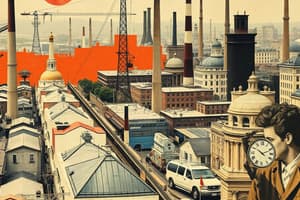Podcast
Questions and Answers
What was a common issue faced by men, women, and children in factories during industrialization?
What was a common issue faced by men, women, and children in factories during industrialization?
- Flexible working conditions
- Long work hours (correct)
- Shortage of workers
- Generous compensation
Why did liberals and radicals believe that individual effort and enterprise should be encouraged?
Why did liberals and radicals believe that individual effort and enterprise should be encouraged?
- To restrict capital operations
- To ensure a healthy workforce and educated citizens (correct)
- To maintain aristocratic privileges
- To promote equal distribution of wealth
What did most industries belong to during the time discussed in the text?
What did most industries belong to during the time discussed in the text?
- Individuals (correct)
- Trade unions
- Government entities
- Large corporations
What was a key belief held by liberals and radicals regarding the development of societies?
What was a key belief held by liberals and radicals regarding the development of societies?
What type of political groups did many working men and women support in the early nineteenth century?
What type of political groups did many working men and women support in the early nineteenth century?
Why did liberals and radicals oppose the privileges of the old aristocracy?
Why did liberals and radicals oppose the privileges of the old aristocracy?
What solution were liberals and radicals looking for to address the problems associated with industrialization?
What solution were liberals and radicals looking for to address the problems associated with industrialization?
What did nationalists, liberals, and radicals in the early nineteenth century want to achieve through revolutions?
What did nationalists, liberals, and radicals in the early nineteenth century want to achieve through revolutions?
'If freedom of individuals was ensured, if the poor could labor, and those with capital could operate without restraint,' what did liberals and radicals believe would happen?
'If freedom of individuals was ensured, if the poor could labor, and those with capital could operate without restraint,' what did liberals and radicals believe would happen?
Flashcards are hidden until you start studying
Study Notes
Common Issues in Factories
- Men, women, and children faced harsh working conditions, including long hours, low wages, and unsafe environments.
- Health hazards were prevalent due to inadequate safety measures and poor sanitation in factories.
Individual Effort and Enterprise
- Liberals and radicals believed that encouraging individual effort would drive innovation and economic growth.
- They argued that personal enterprise fosters competition, leading to better quality products and services.
Industries Ownership
- Most industries were often owned by wealthy capitalists or monopolies, consolidating economic power among a few individuals.
Beliefs of Liberals and Radicals
- A key belief was that societies develop through progress and improvement driven by individual liberty and economic freedom.
- They viewed social change as essential for enhancing personal rights and societal wellbeing.
Political Support in Early Nineteenth Century
- Many working men and women supported political groups that sought rights and reforms, including labor unions and socialist movements.
- They rallied for policies that would protect their interests against exploitation.
Opposition to Aristocracy
- Liberals and radicals opposed the privileges of the old aristocracy because they believed it stifled social and economic mobility.
- They sought a more equitable society where opportunities were available based on merit rather than inherited status.
Solutions for Industrialization Issues
- Liberals and radicals looked for reforms that would address labor rights, working conditions, and equitable pay.
- They aimed to implement social policies that would alleviate the hardships faced by the working class.
Goals of Political Movements
- Nationalists, liberals, and radicals aimed to achieve political rights, self-determination, and equality through revolutions.
- They sought to overthrow oppressive systems and promote individual liberties.
Beliefs about Freedom and Labor
- Liberals and radicals posited that ensuring individual freedoms and allowing the poor to work unrestricted would lead to greater economic prosperity.
- They believed in a self-regulating market where both labor and capital could thrive without excessive governmental control.
Studying That Suits You
Use AI to generate personalized quizzes and flashcards to suit your learning preferences.




